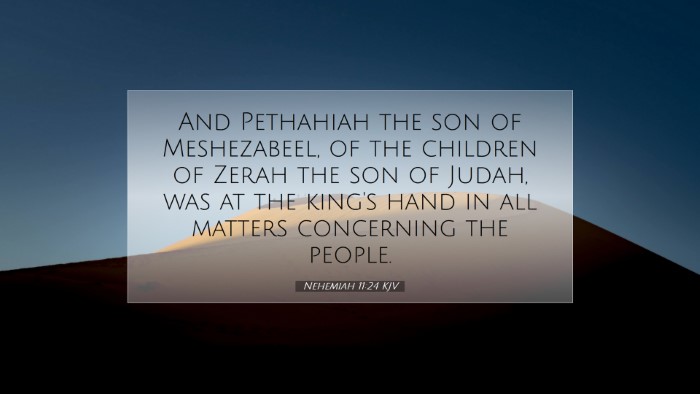Commentary on Nehemiah 11:24
Nehemiah 11:24 states: "And Pethahiah the son of Meshezabel, of the children of Zerah the son of Judah, was at the king's hand in all matters concerning the people." This verse significantly highlights the administrative and social restructuring that took place post-exile in Jerusalem. The appointment of Pethahiah as a representative to the king illustrates the intersection of political authority and the welfare of the Jewish community.
Overview of Nehemiah's Leadership
Nehemiah's leadership serves as a key focal point in the post-exilic period, and this verse reflects the careful organization necessary for rebuilding both the walls of Jerusalem and the community. Several theologians provide insights into the implications of Nehemiah's administrative choices and how these impacts resonate throughout history.
Matthew Henry's Insights
According to Matthew Henry, the mention of Pethahiah underscores the importance of having dedicated individuals to operate in critical roles. Henry notes that Pethahiah was closely situated to the king—a position that would allow him to advocate for the Jewish people effectively. This role is twofold: serving as a liaison between the king of Persia and the city of Jerusalem, as well as addressing issues that arise within the community. The significance of a trusted representative cannot be overstated, as it directly affects the welfare of the people.
Albert Barnes' Commentary
Albert Barnes further elaborates on the political dynamics at play in Nehemiah's Jerusalem. He posits that the reinstatement of representatives like Pethahiah served to maintain stability and facilitate communication with the Persian authority. Barnes emphasizes that Pethahiah's role was not merely ceremonial but was essential for the day-to-day governance and wellbeing of the populace, thereby fostering community trust in leadership.
Adam Clarke's Exegesis
In his exposition, Adam Clarke provides a depth of understanding regarding the socio-political context of the post-exilic Jews. He points out that the position of Pethahiah was occupied by individuals who needed to be of trustworthy character, as they would handle delicate matters and represent the needs of the people. Clarke also references the lineage of Pethahiah—being from the house of Zerah the son of Judah—which lent a sense of legitimacy and authority to his office. This points to the larger theme that leadership structures in the post-exilic community leaned heavily on shared history and heritage, establishing a continuous identity among the people of Israel.
Theological Implications
Theological implications arise from the nature of Pethahiah's role in regard to divine sovereignty and human agency. The verse illustrates how God works through human officials and governance to fulfill His purposes. This blend of divine oversight and human responsibility calls for deeper reflection on the intersection of politics and faith.
- God’s Providence: The Old Testament frequently showcases how God’s hand directs events, as seen through Nehemiah’s careful selection of officials. These dynamics challenge modern believers to recognize God’s active engagement in civil affairs.
- The Role of Leaders: The emphasis on character in leadership highlights the biblical principle of integrity and reliability within political structures. Leaders today, especially in church and community contexts, should seek to embody the same virtues that Pethahiah exemplified.
- Advocacy and Representation: The necessity of having representatives like Pethahiah prompts a discussion about the role of advocacy, especially in marginalized communities, demonstrating a biblical foundation for social justice and active engagement with governing systems.
Practical Applications for Modern Believers
Engagement with Nehemiah 11:24 not only enriches theological understanding but also presents avenues for practical application. Believers and church leaders can draw upon the insights derived from this verse to influence their own ministry and community involvement.
- Encourage Advocacy: Equip church members to advocate for the rights and needs of their communities, following Pethahiah’s example of representing people before authorities.
- Form Leadership Integrity: Emphasize the importance of character and integrity in church leadership, ensuring that those in positions of authority are faithful stewards of their responsibilities.
- Promote Community Unity: Just as Jerusalem needed a unified approach to governance, local churches can foster unity among their members, recognizing the diversity and heritage that each individual brings.
Conclusion
Nehemiah 11:24 may appear as a simple statement about governance, but its implications ripple through time, calling believers to reflect on their leadership roles and responsibilities. The insights of public domain commentaries encourage a deeper understanding of how scripture informs our views on community, authority, and divine providence, urging us to respond faithfully to our callings in today’s world. As the church, may we discern God’s direction in our leadership and advocate for His people just as Pethahiah did.


